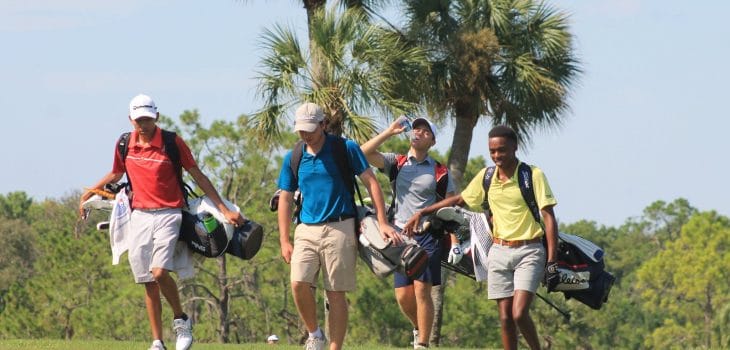
On April 30th, 2020 the NHSGA team hosted a 3-hour live event titled “Recruited: The Ins and Outs of College Golf”. This event brought together top players, coaches, junior golfers, and recruiting experts to tell their stories and help parents and high school students navigate the college golf recruiting process. The event supported the Golf Emergency Relief Fund to support golf industry employees during the COVID-19 pandemic. Guests included Jennifer Kupcho, Keegan Bradley, Buddy Alexander, Herb Page, Katie Brophy Miles, Aidan Thomas, Jessica Meyers, Mike Bender, Trillium Rose and more. Below highlight 6 important college golf recruiting lessons we learned from the discussions with our speakers. You can sign-up to receive the full college golf recruiting video recording.
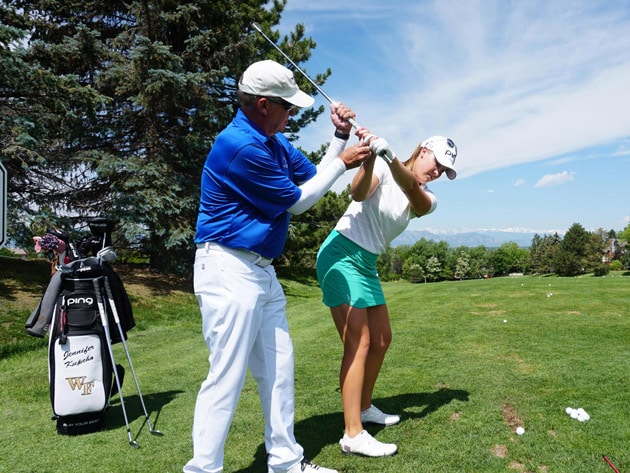
Lesson 1 – Jennifer Kupcho and Ed Oldham
I didn’t play in a lot of big events. I was NOT recruited heavily by many colleges outside Colorado. Her PGA Coach Ed Oldham spoke to the Wake Forest women’s golf coach at The Curtis Cup years after Jennifer was recruited to Wake. Coach Dailey said, “Jennifer was not on my radar. While passing by Jennifer’s group leaving the course at the USGA Junior Girls tournament, I heard an amazing sound when Jennifer hit the ball. Coach Dailey promptly called her assistant coach and told her to come out to watch Jennifer”.
Lesson learned – You can be one of the best players in the world, but sometimes you fly under the radar. It only takes one swing at the right place to get the chance to attend the college of your dreams. Play in the biggest events you can qualify or attend. For Jennifer, the USGA Girls Junior was that chance.

Lesson 2 – Keegan Bradley and Mark Bradley
Keegan grew up with an advantage in that his father was the PGA Professional at a golf course. Mark brought Keegan to the course on a daily basis, not for work, but because it was fun. Keegan would spend all day, every day at the course picking up balls, playing holes, meeting people, and most importantly learned how to work hard on his game. Even though Keegan was a grinder and worked really hard, going to the course was fun. Hitting balls was fun. Picking the driving range was fun. Hanging out with older people was fun.
Lesson Learned – Parents, make sure to keep golf fun for your kids.
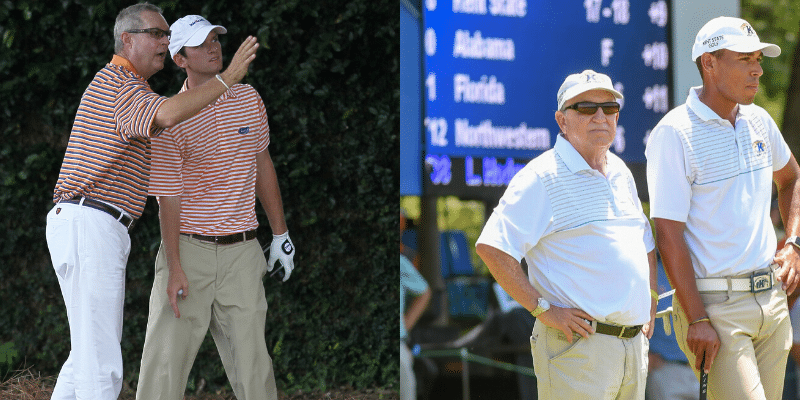
Lesson 3 – Buddy Alexander and Herb Page
Retired Championship college golf coaches Buddy Alexander and Herb Page said when they were coaching college golf, “The Rankings” didn’t exist. Recruiting for college golf is a little bit easier these days for coaches since it is easier to get in touch with people and rankings can help. Both coaches agreed that the “rankings” are not an end-all because some kids cheat the system and only play in certain “ranked tournaments”. Buddy even said I’d rather recruit a kid who won his state Amateur at 15 years old versus a kid who is top-ranked in the country.
Lesson Learned – Rankings are not everything. Competition rounds and scores, regardless of the event size, matter. Coaches said that good recruits need to learn how to win a tournament, not just earn points for playing well in a ranked event.
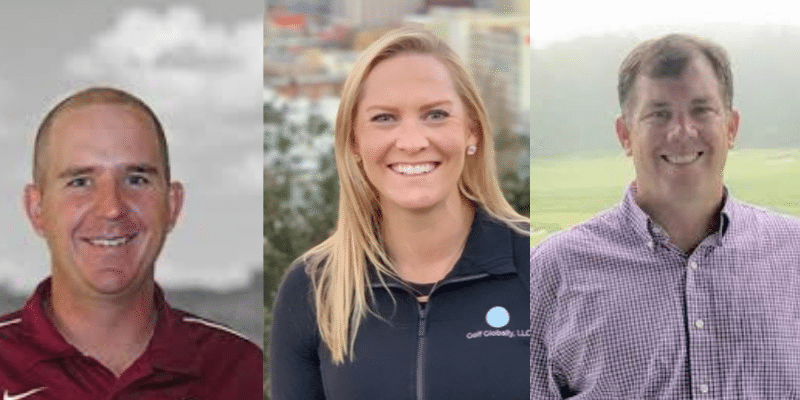
Lesson 4 – Brendan Ryan, Dr. Katie Miles, Roger Knick
If you want to play college golf, your scores are only one part of the equation. Brendan from Golf Placement Services cautioned that for anyone looking to get recruited to play college golf, having good grades is as important if not more important than just having good golf scores. Your SATs are a crucial part of the equation for anyone looking to play college golf.
Lesson learned – Be smart. Be realistic. Compare your SAT scores, golf scores, and grades to what a college program requires. Do your homework on a program and narrow down your search to find the best school that fits your numbers. Junior Golf Hub offers a great platform for high school golfers to help find schools that may be the best fit.

Lesson 5 – Aidan Thomas, Jessica Meyers, Dillon Brown and Tanner Kutek
All four students have had different experiences playing college golf. The students each shared advice about how they went through their college search and what it is like to play college golf. Students and parents thinking about getting recruited for college golf need to think about location, size of the school, the strength of the program, and how academically focused a college may be. Balancing school, college golf, and trying to have a social life is difficult. Tanner Kutek explained how his experience playing club golf was best for him since he has a difficult major and needed to study. Tanner also wanted to stay engaged with his two passions of golf and hockey. Tanner was able to get the best of both worlds by becoming an academic leader on campus while still pursuing his two passions through playing club hockey and club golf.
Lesson Learned – Everyone can play college golf. Whether you want to play varsity golf or NCCGA club golf, there is an opportunity for everyone to play golf in college.
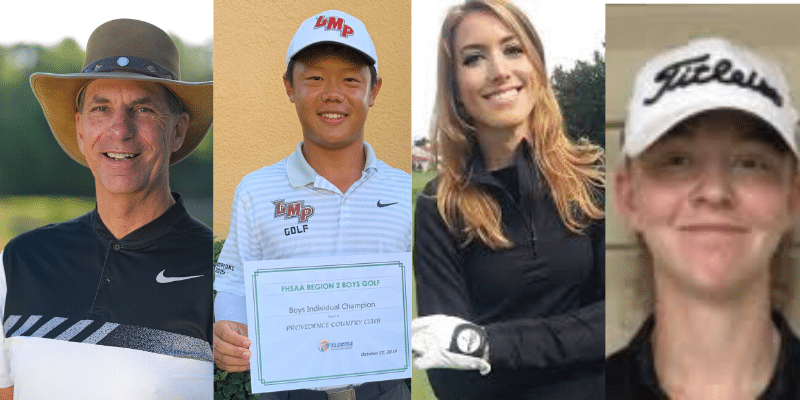
Lesson 6 – Mike Bender, PGA and Trillium Rose, PGA
Mike and Trillium lead a discussion with two of their students Aaron Du and Rebecca Schiffman. Both Aaron and Rebecca talked about their PGA coaches and how much it means to them to have a coach who sets up a plan, teaches them lessons, and helps them become better golfers. Mike and Trillium talked about setting goals and having a plan. If you are a junior golfer looking to play college golf, it is important to have a coach who is going to help you along the way, set realistic goals on where you can play college golf, and utilize their relationships to help you get found by the right college coaches.
Lesson Learned – Every junior golfer looking to play college golf needs a team. Within that team are parents, friends, and most importantly a PGA golf coach who is going to set forth a great golf plan. Here is some info on how to find a PGA golf coach near you.
We hope you enjoyed this article sharing important tips for playing college golf. If you are interested in learning beyond these 6 lessons, you can sign-up to receive the full college golf recruiting video recording.